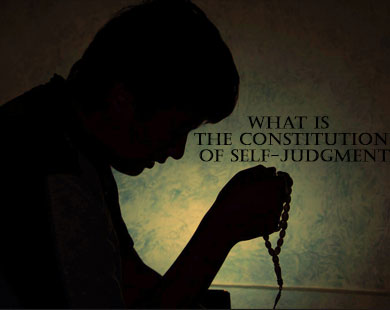Knowing Allah
Muhammed, the Messenger of Allah, has said, "One among you who knows Allah best is the one who fears Him most, and I fear Him even more than him." Ibn Abbas [1] says that a bedouin once came to the Messenger of Allah and said, "O Messenger of Allah! Teach me the most unusual knowledge!" He asked him, "What have you done with the peak of knowledge so that you now ask about its most unusual things?!" The man asked him, "O Messenger of Allah! What is this peak of knowledge?!" He said, "It is knowing Allah as He deserves to be known." The bedouin then said, "And how can He be known as He ought to be?" The Messenger of Allah answered, "It is that you know Him as having no model, no peer, no antithesis, and that He is One and only: He is the One Who is Apparent yet Hidden, the First and the Last, having no peer nor a similitude; this is the true knowledge about Him."
Accurately knowing Allah is the pillar whereupon Islam in its entirety hinges. Without such knowledge, any action in Islam does not have any real value whatsoever: it has neither essence nor value. The Question is: "How can we get to know Allah, and what is the venue for attaining such knowledge?" The answer is crucially conditional: If we do not know the right course, we can never reach our destination. Any erroneous approach to knowing Allah is a major contributor to distancing a large number of people from accurately getting to believe in Allah. The Holy Quran narrates to us stories about those who disbelieved in Allah in every age and time, depicting for us how they insisted, in order to believe in Him, on hearing or seeing Him, relying on their senses. Following are only a few examples: Allah Almighty has said, ﴾And those who have no knowledge say: Why does not Allah speak to us or a sign come to us? Even thus did those before them say; (they said) the like of what such people say; their hearts are all alike. Indeed, We have made the signs (leading to belief in Him) clear for people who are sure.﴿ (2:118)
﴾And those who do not hope for Our meeting say: Why have no angels been sent down upon us, or (why) do we not see our Lord? Certainly they themselves are too proud and have revolted in great revolt. On the day they see the angels, there shall be no joy on that day for the guilty...﴿ (25:21-22
﴾Pharaoh said: O Haman! Build me a tower so that I may attain the means of access, the means of access to the heavens, then (I may be able to) reach the God of Moses, and I surely think he is a liar. And thus was the evil of his deed made fair-seeming to Pharaoh, and he was turned away from the (right) course﴿. (40:36-37
"Turned away from the (right) course" refers to the course that ends with acquiring a sound and accurate knowledge of the Almighty. Such a goal should be our first and foremost concern. Without properly knowing Allah, how can we properly worship Him? The Messenger of Allah Muhammed has said in a qudsi tradition, "For everything there is a path, and the path to Paradise is knowledge." This is a humble attempt to search for such sound and accurate knowledge, the one that brings us closer to our Lord and leads us to the path of salvation, to happiness both in this life and in the eternal life to come.
Muslims Start Everything in the Name of Allah
In one hadith, the Messenger of Allah is quoted saying, "Anything which does not start with the Name of Allah is cut-off (from Allah's blessing)." It is customary for Muslims to invoke the Name of Allah whenever they do anything important, or whenever they seek His protection against His arch-enemy and our Satan the Accursed. Examples are: When they stand up or sit down, when they eat or drink, when they enter their homes, when they open the door of their cars or bathrooms or any room in the house, when they start the engines of their cars, when they put on or take off their clothes, when they ascend or descend a ladder, when they start writing something important, when they slaughter an animal decreed by Allah as lawful for their food..., and even when they cohabit with their wives in the hope Allah will bless them with righteous progeny. Such are the manners of good Muslims. So let us start in the Name of Allah Who created and determined everything from nothing, the ever-Living, the Eternal Who is never affected by time, nor space, nor anything else, Who never initiated a place for His being, nor did He attain His might after having created everything, nor was He weak before then. In the Name of Allah Who never needed company before creating everything. In the Name of Allah the like of Whom there is none at all, nor was He without His domain before the latter's creation. In the Name of Allah Who hears without a hearing faculty, Who sees without vision. In the Name of Allah Who is Mighty without having to derive His might from His creation. In the Name of Allah the eyes of Whose creatures can never see Him, the Most Exalted One, the all-Knowing. I testify that Allah is the One and Only God; there is no partner with Him, the One and only One upon Whom all things and beings depend. He does not beget, nor is He begotten, nor is there anything like Him. I further testify that our master Muhammed is His Servant and Messenger, bearer of His Message and of the glad tidings, the one whom He trusted for His revelation; blessings of Allah be upon him and his righteous and pure progeny.
How Prophet Muhammed Praised His Lord
Our master Muhammed has said,
All Praise is due to Allah, the One and only God. His being Eternal is compounded by His being Divine. He is Proud in His own right and in His Greatness. He creates whatever He wills and initiates the creation without having to have a model for any of what He creates! Our Lord is the One Who has always been beyond time as such; through His knowledge has He split the seed; through His Might has He created all creation; through the light of the morning has He started the dawn; there is none that can alter what He has created, nor is there any that can change what He has made, nor is there any that can revoke His decree or repeal His command or be exempted from His call! There is no extinction to His domain, nor is there a term for His Divinity. He is the first to create, the One Who is eternal even beyond eternity itself, the One Who has obscured Himself from His creation in the horizon of ambition, in the lofty Exaltation, in the abundant domain, higher than anything that is high. Yet He is close to everything, so He manifests Himself to His creatures even without being seen, while He is the most Sublime! By His Light He veiled Himself and ascended the height, obscuring Himself from His creation. He sent them messengers so that He would have a clear argument against them, and so that His messengers would testify against His creation. He sent prophets to them to bring them glad tidings and to warn them, so that He would guide whomsoever He pleases after providing them with His clear signs and bringing to life whomsoever He pleases with the same, hence the creation will know about their Lord that which they did not know, and they will know Him as their God after having rejected Him. They will believe in His Unity after having persisted in denying it.
Commonly Asked Questions About "Allah"
Let us now try to answer a number of basic questions about the Almighty:
1. How can you describe Him?
Numerous verses of the Holy Quran point out to His existence. Consider the argument of His Friend Ibrahim (Abraham, as) who said: ﴾My Lord is the One Who brings life and Who causes death﴿ (Quran, 2:258), and the argument of Moses who said, ﴾[He is] your Lord and the Lord of your fathers of old﴿ (Quran, 26:26). Also consider these verses: ﴾Our Lord is the One Who gave everything its creation, then He guided it (to its destination﴿.. (20:50) ﴾The Lord of the East and the West: there is no god but He; therefore, take Him for a protector﴿. (73:9
2. Can you define Him?
The Exalted One says that He defies definition: ﴾... nothing at all is like Him﴿ (Quran, 42:11).
3. Can one ask: "What is He?"
Pharaoh asked Moses, ﴾And what is the Lord of the worlds?﴿ (Quran, 26:23). Moses answered by saying that He is ﴾Your Lord and the Lord of your fathers of old﴿ (Quran, 26:26). There is no way to know Him by defining "what" He is; rather, one can get to know the proofs of His Existence, Might, Knowledge, Wisdom, Mercy and His being the Creator of everything. "Do not think about Allah," said Imam Ali, "rather, think about what Allah has created, for thinking about Allah only increases one's bewilderment."
4. Is He one or more?
The Glorified One has required the Muslims to Say: He, Allah, is One. (112:1)
And your God is One God! (2:163)
Had there been in them any gods besides Allah, they would both have certainly been in a state of disorder. (21:22)
5. Is He confined to any place?
The Holy Quran tells us that: ﴾He is the Supreme (watching) over His worshippers﴿ (6:61 ﴾They revere their Lord High above them﴿ (16:50 ﴾The Beneficent God is firmly established on the throne (of authority)﴿ (20:5
"Above them" in 16:50 refers to the Almighty being above His servants in His Might, Power, Loftiness, not to being above them in place, space, area, elevation, or physical location; these do not apply to Him. The Messenger of Allah called upon His Lord during his ascension to heavens pleading to Him thus, "You are as You have praised Your own Self," and Prophet Younus (Jonah) son of Matti, while being in the bottom of the sea, called upon his Lord saying, ﴾There is no god but You! Glory to You! Surely I have become one of those who commit injustice against their own souls!﴿ (Quran, 21:87). The Messenger of Allah has said, "Do not exalt me over him [over Younus] in nearness to Allah just because I reached the High Throne while he was in the bottom of the sea, for the Adored One is above being confined to a space or a direction." He has also addressed Him saying, "You and he in the strata of the heavens;" the believers call upon Him saying, "You and them on earth." Had He been in a particular area or place, all these persons could not have differed from one another in His regard at any given time. He is above being confined to place or direction: ﴾All those in the heavens and the earth glorify Allah﴿ (Quran, 57:1).
6. When did He begin to exist?
The Praised One has said, ﴾He is the First and the Last, the Evident and the Immanent, and He has full knowledge of all things﴿. (57:3 ﴾Everything is to perish except He﴿. (28:88
Anyone who asks when His existence came to be implies that there was a time when He did not exist, i.e. that void preceded Him. He is not "preceded" by anyone, nor is He "succeeded" by anyone. His continuation is above being tied to time. His existence is too holy to be dependent on time; such are characteristics of things or persons who come to be then perish, or of those whose being is possible in the future, but they do not apply to Him. Another verse which similarly describes His eternity and perpetuity is this one: ﴾Everyone on earth will perish but will abide (forever) the Face of your Lord, full of Majesty, Bounty and Honour﴿ (Quran, 55:26-27), and also this: ﴾Blessed is He in Whose hands is the dominion﴿ (Quran, 67:1). "Blessed," that is, tabaraka, is derived from baraka, blessing, which connotes constancy and lack of acceptance to change. His existence is everlasting, eternal, perpetual.
7. Over what does He rule?
The Almighty says, ﴾Say: O Allah! Master of authority! You give authority to whomsoever You please and take it away from whomsoever You please﴿ (Quran, 3:26). He, and only He, is the King of kings; He grants others authority: ﴾Blessed is the One in Whose hand is the kingdom﴿ (Quran, 67:1). Vanities and possessions owned by others will all disappear on the Day of Judgment: ﴾Whose will be the dominion that Day? It is Allah's, the One, the Subduer (of all)﴿ (Quran, 40:16).
8. What is [the extent of] His knowledge?
He has said, ﴾[He is] the One Who knows the unseen and the seen﴿. (6:73 ﴾And with Him are the keys of the unseen treasures: none knows them except He﴿. (6:59 ﴾Slumber does not overtake Him nor sleep﴿. (2:255) ﴾And your Lord is not forgetful.﴿ (19:64 ﴾And you are not (engaged) in any affair, nor do you recite concerning it any portion of the Quran, nor do you do anything, except that We are witnesses over you when you enter into it﴿. (10:61
How to Supplicate to Allah
Before addressing the issue of how to supplicate to Allah, we need to tackle the subject of how we worship Him.
After Allah, the Glorified and the Exalted One, had created us, after we admitted His Oneness and Might, and after He had taken from us a covenant and made us bear witness against our own selves that He is our Creator, He returned us to the loins of Adam, made us in the loins of humans, each in the loins of his forefathers, then He brought us into this world whenever He willed, defining His reason for creating us, which is: to worship Him, and only Him. After having sent us prophets and messengers during various ages to warn us against worshiping anyone but Him and chosen the best of His messengers for us, namely our master Muhammed, the best of creeds, namely Islam, and the best of divine books, namely the Holy Quran..., after all of that, it becomes incumbent upon us to answer questions such as: How are we to adore Allah? What are the best means to achieve this end?
The answers to these questions are provided by the best of creation, messengers and prophets, our master Muhammed . Having been asked once what adoration was, he answered, "Supplication is adoration," then he recited the Quranic verse saying, ﴾And your Lord says: Call upon Me, I will answer you; surely those who are too proud to worship Me shall soon enter hell abased﴿ (Quran, 40:60).
In order to emphasize the fact that supplication is the zenith of adoration as the Holy Quran states, we would like to present some Quranic verses that highlight this fact and underscore the significance of supplication: ﴾Say: My Lord would not care for you were it not for your du' (supplication).﴿ (25:77 ﴾And who speaks better than he who calls to Allah while he himself does good [deeds] and says: I am surely of those who submit (to Allah in Islam)?﴿ (41:33 ﴾Those to whom they call upon, they themselves seek the means of access to their Lord__whoever of them is nearest__and they hope for His mercy and fear His chastisement.﴿ (17:57 ﴾And withhold yourself with those who call on their Lord morning and evening desiring His goodwill﴿ (18:28 ﴾Their sides draw away from their beds; they call upon their Lord in fear and in hope.﴿ (32:16 ﴾They used to hasten, one with another, in deeds of goodness and to call upon Us, hoping and fearing.﴿ (21:90 ﴾To this then go on inviting, and go on steadfastly on the right way as you are commanded, and do not follow their low desires.﴿ (42:15) ﴾And I will call upon my Lord; maybe I shall not remain unblessed in calling upon my Lord. (19:48)﴿ ﴾He is the Living, there is no god but He; therefore, call on Him, being sincere to Him in obedience. (40:65)﴿ ﴾Praise to Allah Who has given me despite old age Ishmael and Isc; most surely my Lord is the Hearer of prayer.﴿ (14:39 ﴾And when My servants ask you concerning Me, surely I am very near; I answer the prayer (supplication) of the suppliant when he calls on Me.﴿ (2:186
These are only samples of what the Holy Quran contains of verses stressing the importance of supplication for the creation, clarifying for them the status supplication enjoys with their Creator.
A SUPPLICATION CONTAINING ALLAH'S GREATEST NAME
Imam al-Husain ibn Ali ibn Abu Talib is quoted narrating the following incident: "We were making our tawaf around the Kaba when we heard someone reciting these verses of poetry:
O You Who answers the distressed and those who in the depth of the darkness utter their supplication, O You Who removes the causes of the trials, the pain, together with the tribulation, Around Your Sacred House are Your guests who have come from everywhere, Supplicating while the eyes of Allah never sleep, always aware, I plead to You to grant me Your Forgiveness for the sins I have committed, by Your Grace, Your creation knows You, Lord, to be Most Gracious, so I plead to You by the Light of Your Face! If Your pardon never reaches a sinner nor bless, Who is to be gracious unto those who transgress?
"My father Ali ibn Abu Talib," the Imam continued, "O Husain! Don't you hear someone grieving about his sin, complaining to his Lord? Go and bring him here.' So I hurried till I was able to reach him. I found him to be a handsome man, his body looked free of deformity, his clothes seemed to be very clean, and I could smell the fragrance he was wearing. I also noticed that his right side was paralyzed. I approached him and ordered him to present himself before the Commander of the Faithful. He came and the Commander of the Faithful asked him, 'Who are you, and what is your story?' The man said, O Commander of the Faithful! What is the case of a man who opted to do what is punishable while not performing what he is enjoined to perform?' The Imam asked him again, 'What is your name?' The man answered, 'Munzzil son of Lahiq.' He asked him, 'What is your story?' He said, I used to be quite famous among the Arabs for merry-making and sinning in my youth, without waking from my slumber. Now if I repent, my repentance will not be accepted from me, and if I try to amend my steps, I will not be able to do that either. So I prolong my transgression during the [sacred] months of Rajab and Shaban. My father used to be quite affectionate and compassionate towards me. He used to warn me against the outcome of my ignorance and the terrible end awaiting the transgressors. He used to say, O son! Allah sometimes manifests His might when He expresses His Wrath; so, do not tread the avenues of those who will be penalized with the Fire, for how often people have complained about you, and so have the sacred angels, and the sacred months, the nights, and the days?' Yet whenever he persisted in admonishing and reprimanding me, I persisted in beating him. One day, when my conduct pressured him too much, he said, By Allah I am going too fast and will not break my fast, and I shall offer prayers and will not sleep...' He fasted for one week, then he rode a lean camel and went to Mecca for the pilgrimage and said, I shall go to the House of Allah, and I shall plead to Allah to side with me against you.' He reached Mecca on the day of the Great Pilgrimage, took hold of the curtains of the Kaba and invoked Allah against me saying,
O One to Whom pilgrims come from far and wide, Those who come walking, and those who ride, Hoping to win he Grace of the One, the Dignified, The One who Sustains, from Whom none can hide, This Munazil never seems to cease, though I chide, So effect retribution; Your Judgment none can override, And do inflict pain on him and do paralyze his side, You were never born, nor bears, but is always sanctified!
"I swear by the One Who raised the heavens and caused the water to form springs, he hardly finished his statement when my right side was completely paralyzed, and I remained like a piece of wood lying somewhere in the precincts of the Sacred House. People used to come and go and say about me, This is a man the plea of whose father Allah has answered.'"
Imam Ali asked him, "What did your father do?" He said, "O Commander of the Faithful! I requested him to invoke Allah on my behalf in the same way he invoked Him against me, now since he reconciled and was pleased with me. I placed him on a she-camel and we rushed till we reached the valley of Arak when a bird suddenly flew from a tree and scared the she-camel. My father fell and died on the way.' Ali said, "Shall I teach you certain invocations which I have learned from the Messenger of Allah and about which he said that nobody recites them without Allah Almighty removing his distress from him?" He said, "Yes, please do!" Imam al-Husain stood up and taught him the invocation. He recited it and was healed from his ailment and his complete health returned to him. I asked the man, "What did you do?" He said, 'When all the eyes calmed down, I recited it, then repeated it a second time, then a third, whereupon I heard someone saying, Suffices you Allah, for you have invoked Him by His Greatest Name which, if anyone implores Him by it, He will answer him, and if anyone requests him for something, He will grant it!' So I slept and I saw the Messenger of Allah in my vision, and he said to me, Truly Ali, my cousin, has told you the truth: it does contain Allah's Greatest Attribute which, if one pleads to Him by it, He will oblige, and if one asks Him for something, He will grant it.' Then I saw him a second time in a vision, so I said to him, O Messenger of Allah! I love to hear you reciting that invocation!' He said,
Lord! I plead to You, O One Who knows what is hidden! O One by Whose Might the heavens is erected, and the earth is spread out, and the sun and the moon through the Light of Whose Greatness illuminate and shine! O One Who approaches every believing and pure soul! O One Who removes the fear of those who are in awe of Him, those who are righteous! O One Who takes care of all the needs of His creation, Who has saved Yousuf from the bondage of slavery, Who has no doorman to be approached, nor does He have a supporter to be defeated, nor does He have a vizier to be bribed, nor is there any other god besides Him so he would be called upon, nor does He increase, despite His giving, except in giving and in open-handedness..., and surely Allah has blessed Muhammed and his progeny! Whereupon I implore You, Lord, to grant me my quest, for You can do anything at all.
"So I woke up and I was healed." Ali said, "Uphold this supplication, for it is one of the treasures of Paradise."
* The Concept of God in Islam. Yasin T. al-Jibouri




















